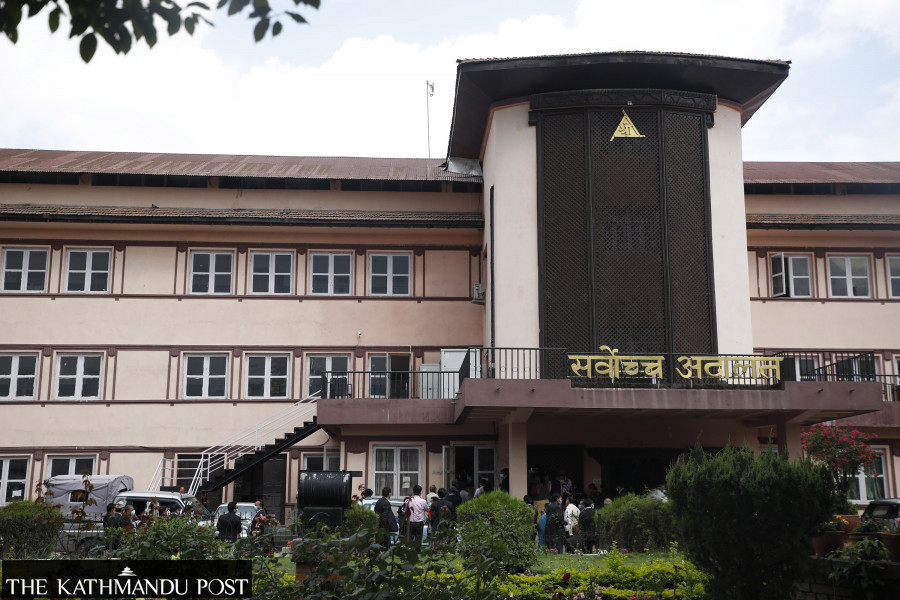National
Legal fraternity split over eligibility of former chief justices and justices to run for President
Thursday’s statement by sitting justices’ body criticised as breach of code of conduct for judges.
Tika R Pradhan
Nepal’s legal fraternity is sharply divided over whether former chief justices and justices of the Supreme Court can contest the presidential election.
A day after the Supreme Court Bar Association chair stated that former justices cannot take part in presidential elections, Judges’ Society Nepal, an organisation of incumbent justices, said on Thursday that there is no restriction on former chief justices and justices to vie for the positions that are filled by elections, including the posts of President and Vice-President.
On Wednesday, Supreme Court Bar Association said former chief justices and justices can’t become candidates for the top state posts. Association chair Harishankar Niraula on Wednesday said that Section 12 of the President and Vice-President Election Act, 2017 bars former chief justices and justices from contesting for the posts.
Section 11(e) states that those who are in a position of benefit stand disqualified to become a candidate for both President and Vice-President. The former chief justices and justices get pensions from state coffers.
But issuing a statement on Thursday, the society said that it was unfortunate that former justices have been labelled ineligible to contest for government posts through a democratic process by garnering the public’s mandate.
Thursday’s statement by Justice Ishwar Prasad Khatiwada, chairperson of the society and a sitting Supreme Court justice, has come amid recent suggestions from some quarters that a former chief justice could be an ideal non-political candidate for President.
The society, in the statement, said that the constitutional provision regarding the appointment of former chief justices and justices does not bar them from contesting for government posts that are filled through elections.
“The intention of the constitutional provision that says a retired chief justice or justice, who has contributed to the nation while holding important responsibilities of the judiciary of Nepal, is not eligible for appointment to any government post, does not necessarily mean that they cannot become candidates for positions filled through election, according to the Constitution of Nepal,” reads the statement.
“Article 64 of the Constitution of Nepal provides that any person who is qualified to be a member of the Federal Parliament who has reached the age of 45 and who is not disqualified by any law, is eligible for election to the post of President and Vice-President of Nepal,” the statement reads.
The statement reads that no law, including Section 12 of the President and Vice-President Election Act, 2017, has any provision to bar retired chief justices or justices of the Supreme Court from contesting presidential or vice-presidential elections.
While the legal fraternity is divided over the eligibility of former chief justices’ and justices’ to contest for the presidential post, the statement issued by Khatiwada has raised yet another question.
Former chief justices and justices of the Supreme Court have taken a strong exception to the Judges Society Nepal’s statement saying sitting judges should not speak on such issues as it violates the Code of Conduct for Judges 2009.
“Whatever comment a sitting justice makes is a verdict of the Supreme Court,” said former chief justice Anup Raj Sharma. “So, they must not speak on such issues. But unfortunately, our sitting judges have shown their greed.”
Clause 4.4 of the Code of Conduct for Judges states that a judge shall not knowingly, while a proceeding is before or could come before the judge, make any comment that might reasonably be expected to affect the outcome of such proceeding or impair the manifest fairness of the process. Nor shall the judge make any comment in public or otherwise that might affect the fair trial of any person or issue, it stated.
Balaram KC, former justice of the Supreme Court, termed issuance of the statement by the Judges’ Society ‘an accident’.
“Since the justices have already made their decision on the issue, what will be the public perception of the judiciary?” asked KC. “This is actually a judicial accident.”
KC said the Supreme Court should come up with a public statement saying the judiciary is non-committal to the statement issued by the sitting justices on Thursday.
All three constitutions of Nepal since 1990 barred former justices of the Supreme Court from assuming positions of benefit except at the National Human Rights Commission.
Although the Supreme Court Bar Association has made its stance clear, the country’s umbrella organisation of lawyers–the Nepal Bar Association–has remained silent on the matter.
“Nepal Bar Association also must make its stance clear at the earliest,” said KC, the former justice.
KC thinks that the constitution has clearly barred both sitting and former justices of the Supreme Court from assuming any government office.
Article 132(1) has stated that no Chief Justice or Judge of the Supreme Court shall be engaged in or deputed to any office other than that of Judge. Provided that the Government of Nepal may, in consultation with the Judicial Council, depute a Judge of the Supreme Court to work concerning the judicial inquiry, or to legal or judicial investigation or research for a specified period.
A similar provision is there also for the former justices as well.
And 132(2) says no person who has once held the office of Chief Justice or a Judge of the Supreme Court shall be eligible for appointment to any government office, except as otherwise provided in this Constitution.
The major question, according to Sharma, is that the state should refrain from luring former justices with such illegal offers.
“If they can contest the presidential election why can’t they become ambassadors?” Sharma told the Post. “Once you open the door, you cannot stop them.”




 18.12°C Kathmandu
18.12°C Kathmandu














